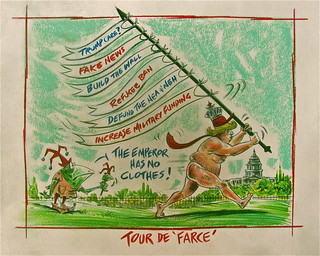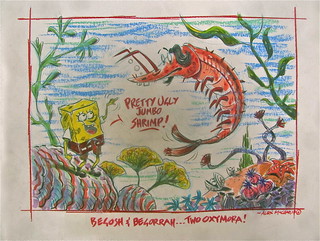|
Home
|
AWADmail Issue 771A Weekly Compendium of Feedback on the Words in A.Word.A.Day and Tidbits about Words and LanguageSponsor’s Message: We’re a 100% American, proudly-independent (some would say quixotic and recalcitrant) design studio, so spring is our favorite holiday, if you know what we mean. “Old’s Cool” sums up our philosophy of life in a neat little turn of phrase -- old school with a shot of wry, served neat. In that spirit, we’re offering this week’s Email of the Week winner, Christopher Shea (see below), as well as all rebels, renegades, disrupters, and dreamers everywhere 19% off everything in store -- through midnight Monday only. BUY into “Old’s Cool” NOW -- and be sure to use coupon code “dreadnaught”.
From: Anu Garg (words at wordsmith.org)
“The Little Prince” becomes world’s most translated book, excluding religious works
What Happened to Who?
From: Pauline C Williams-Greasley (pauline.c.williams-greasley aexp.com) I’ve been a subscriber for a number of years now, and I thought it’s past time to let you know how much pleasure your emails bring me. I read every one. Sometimes when I’m busy I have to read a week or two’s worth all at once. When I’m stressed, they’re my escape. I particularly enjoy the quotation at the end of every word selection. Sometimes the quotations make me laugh, a few I vehemently disagree with, but your choice of quotations always makes me think, often in a different direction from which I’m accustomed (which is a very good thing, I think). Thank you so much for all your hard work at bringing light. It is much appreciated and much needed, especially now.
Pauline C Williams-Greasley, Brooklyn, New York
From: Lynn Goodman (lrcgoodman gmail.com) Some time ago I came across a cute story about a youngster who came home from school and announced to her grandmother that the class had learned how to make babies that day. The grandmother looked startled, but cautiously asked the child to tell her what she’d learned. The little girl said, “It’s easy -- you drop the ‘y’ and add ‘ies’.” And promptly ran off to play. It’s the simple things in life that can buoy us up.
Lynn Cozza Goodman, Portland, Oregon
From: Jon von Gunten (jon globescope.us) In our family, when we can’t recall some odd, clumsy, funny-sounding, or elusive plural, we default to the biblical Hebrew and whimsically add “-im”. It works for “cherubim” and “seraphim”, so we make it work for oxim, sheriffim, and toothbrushim.
Jon von Gunten, Los Angeles, California
From: Philip Snelson (philipjsnelson gmail.com) The poem dealing with quirks of the English language purports to show eight ways of pronouncing “ough”, but in so doing shows only seven such ways. It cites “slough’, which in fact, is usually pronounced as “cow”, as in slough of despond, and/or as “luff”, as in say a snake sloughing off its skin. The eighth form of pronunciation is, as I recall, pronounced as “hock”, and in bringing this to your attention, I quote the following from a very influential book my late mother relied upon (and had used in her school days), which was Campbell’s Higher English, and which was published at least 100 years ago. “The rough-coated, dough-faced ploughman strode coughing and hiccoughing through the streets of Scarborough leading a horse whose leg had been houghed.” (ref)
Philip Snelson, Sydney, Australia
From: Marc Meketon (marc.meketon oliverwyman.com) Your topic of irregular plurals this week reminds me that Euro is one of them. At first, it was declared not to have a distinct plural (from what I can tell, it was declared to have a single spelling, and that seems to have been interpreted as not allowing a plural), and to be capitalized. 1 Euro, 10 Euro. (ref) Eventually, different countries and different European committees changed that. Some countries like Ireland use 1 euro, 10 euro. Others such as France and Spain use 1 euro, 10 euros. (ref) The European Commission Directorate General for Translation Style Guide for English (see their Section 8.4) advises to use euro for the singular and euros for the plural.
Marc Meketon, Ambler, Pennsylvania
From: Yitzhak Dar (yitzhakdar gmail.com) You wrote “... that’s what a thousand years of history will do to a language.” One of the great US minds, Supreme Court Justice Oliver Wendell Holmes, wrote in his book The Common Law, published in 1881, “The life of the law has not been logic; it has been experience.” The same principle was used by him when he wrote in his opinion in NY Trust Co. v. Eisner, 256 US 345, 1921, “A page of history is worth a volume of logic.” It seems that language and law have some similarities.
Yitzhak Dar, Haifa, Israel
From: Ray Schlabach (crdutchman gmail.com) When I was in high school, I often heard the band practicing. My father was on the school board, and one evening my brother and I went along and explored the high school. I found in the music room sheet music and recognized it as the tune I often heard. I memorized the words: “May my kye come home at even.” It obviously referred to cows. But it is not in my dictionary. I knew the plural kine from reading the Bible. Recently I went to the Internet and found that kye is used in Scotland and northern England.
Raymond Schlabach, Heredia, Costa Rica
From: Mary Feeney (MMFeeney aol.com) Regarding truly irregular plurals in French, there’s a famous trio: “amour, délice, and orgue” are grammatically masculine in the singular and feminine in the plural. See more here.
Mary Feeney, Prior Lake, Minnesota
From: Roy McCoy (roymccoy.nl gmail.com) I yesterday read with interest your remarks about irregular plurals, and “what a thousand years of history will do to a language”. Are you aware that Esperanto has no irregular plurals? Nor will it ever have them even in a thousand years, because an essential trait of the language is that the plural is invariably formed by the simple addition of j. Tablo = table, tabloj = tables, for example.
Roy McCoy, Managua, Nicaragua
From: Andrew Pressburger (andpress sympatico.ca) Here is a third way of spelling the plural of chrysalis: chrysalids, as in the title of John Wyndham’s 1955 science fiction novel. The book is a powerful allegorical battle-cry against prejudice, discrimination, and bigotry. In the midst of apocalypse, the future of mankind is being shaped by a new, physically and mentally altered, generation that will be the hope for continuity of life on earth, beyond the radioactive cataclysm that present-day inhabitants have created by their accident-fraught mindless quest for grandeur.
Andrew Pressburger, Toronto, Canada
From: Bob Wilson (wilson math.wisc.edu) I was struck by how my ear and brain matched chrysalis with ephemeris in the plural. I’ve used it for years and have never found the plural ephemerides “comfortable”, but it does sound similar to chrysalides!
Bob Wilson, Fitchburg, Wisconsin
From: Ron Davis (davises magma.ca) While reading The Greatest Story Ever Told -- So Far by Lawrence Krauss, I encountered the phrase “detour de force”, referring to some brilliant theoretical work that turned out to be applicable to a different topic than originally intended.
Ron Davis, Deep River, Canada
From: Barbara Fix (baafix earthlink.net)
A great song is The Bourgeois Blues
by Lead Belly,
written after being refused a hotel room in Washington, DC, because he was
black. He was inspired by his companion’s (Alan Lomax’s) angry comment then
of what a bourgeois town Washington was.
Barbara Fix, Santa Fe, New Mexico
From: Donna Wells (donnacoxwells gmail.com) This word has been shortened to boojie, and my daughter uses it pejoratively to mean people who only care about possessions.
Donna Cox Wells, Tarzana, California
From: Allen Dodworth (dodworth xmission.com) Yes, the name given to Rodin’s great and moving sculpture calls them Les Bourgeois, but in this case, “today’s word” is usually put in English as Burghers, and the definitions offered today for bourgeois bear no relationship to their legendary sacrifice. Bad choice to illustrate the lower case “b” word.
Allen Dodworth, Salt Lake City, Utah
From: Christopher Shea (crshea1 gmail.com) Subject: Oxymoron You provided a clever example of an oxymoron by showing a sign that named the “canyon without a name”. Of note, in anatomy the hip bone is sometimes called the “innominate” or “unnamed” bone for the very good reason that it comprises three separate “named” bones: the pubis, ilium, and ischium. Other examples of innominate anatomic structures are also described.
Christopher R. Shea, MD, Eugene J. Van Scott Professor in Dermatology,
University of Chicago Medicine, Chicago, Illinois
From: Cathy Hughes (hughesor hotmail.com) I’ve decided that the title “President Trump” is an oxymoron.
Cathy Hughes, Lake Oswego, Oregon
From: Alex McCrae (ajmccrae277 gmail.com)
Hans Christian Andersen’s tale of The Emperor’s New Clothes couldn’t be more prescient in “The Age of Trump”.
SpongeBob encounters a quizzical double oxymoron... a pretty ugly jumbo shrimp.
Alex McCrae, Van Nuys, California
From: Anu Garg (words at wordsmith.org)
From: Anu Garg (words at wordsmith.org)
When Henry the Eighth was a chrysalis
A young girl named Amaryllis
A man who believes his imago
“Your bride has turned harlot,” said Iago,
In Oslo a diplomat Norse
In France, whether poor or bourgeois,
The conclusion is pretty foregone
Of the things in the night that go bump,
Oxymora make me laugh:
If compassion we’re now making war on
From: Phil Graham (pgraham1946 cox.net) Noting the store’s high prices, the bride-to-be said, “If invitees can’t china or silver us, perhaps they’ll chrysalis.” Don’t rely on your beauty. When you’re older, imago away. The Amazon woman attacked me so I gave tour de force of my right fist. “That English prof is an incredəble boor; schwa sounds aren’t lecture-worthy!” Considering Occidental’s growth under his leadership, Armand Hammer was no Oxymoron.
Phil Graham, Tulsa, Oklahoma
A THOUGHT FOR TODAY:
It’s surprising how much memory is built around things unnoticed at the
time. -Barbara Kingsolver, novelist, essayist, and poet (b. 8 Apr 1955)
|
|
Awards | Stats | Links | Privacy Policy
Contribute | Advertise
© 1994-2026 Wordsmith

